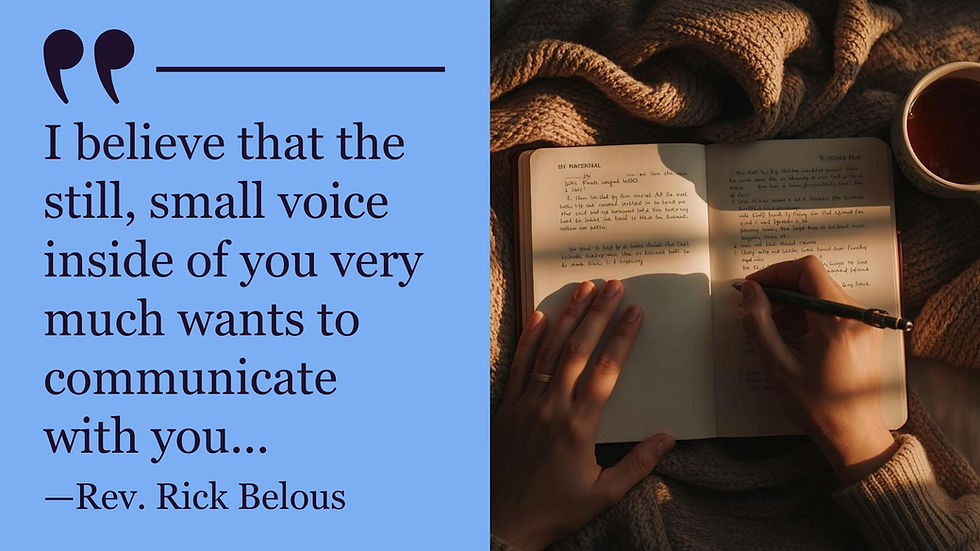Why Human Rights Are Sacred, Not Just Legal
- Rev. James Trapp

- Apr 29, 2025
- 3 min read

What gives a human being their worth?
Is it citizenship? Legal status? Or is it something more profound - something sacred?
Before I was a minister and spiritual teacher, I practiced law. As I witness the whirlwind of political debate and policy around immigration, policing, and civil liberties, I can't help but reflect on the intersection between our spiritual nature and our legal structures - particularly regarding human rights.
We often think of human rights as secular, political concepts. But in truth, they are spiritual in origin. They arise not from governmental decrees, but from a shared sacred understanding that every human carries an inherent dignity that transcends borders, races, or beliefs. That truth is a moral ideal enshrined in law and spirit.
Rights Beyond Borders: Law Reflects Spirit
While often considered exclusive to American citizens, the U.S. Constitution offers protections rooted in universal principles. The 5th Amendment’s Due Process Clause states that "no person shall be deprived of life, liberty, or property without due process of law.” Not “citizen” — person.
Likewise, the 14th Amendment’s Equal Protection Clause guarantees that, “no state shall deny to any person within its jurisdiction the equal protection of the laws.” These are more than legal technicalities — they are spiritual affirmations that every soul, regardless of nationality, is worthy of justice and dignity.
The Case of Kilmar Abrego Garcia
This brings us to the case of Kilmar Abrego Garcia, a man who legally lived, worked, and raised children, including a special-needs son, in the United States. Despite winning a court case that protected him from deportation, he was ripped from his family, shackled, and sent to a prison in El Salvador.
Why? Because someone once claimed he looked like a gang member for wearing a Chicago Bulls hoodie.
No trial. No evidence. No due process. No equal protection.
This event is not just a policy failure. It's a spiritual crisis. Because when we violate the humanity of one person, we undermine the sacred foundation upon which our legal system, and our society, rests.
Human Rights Are Spiritual Rights
As Dr. Suheil Bushrui stated in a 1997 keynote, "Human rights are essentially a codification of mainly spiritual laws." These are not Western inventions but the cumulative achievement of the world’s religious traditions — from the Code of Hammurabi to the Islamic protections of women's rights to the teachings of Jesus the Christ, Moses, Buddha, and beyond.
All spiritual traditions affirm this: We are spiritual beings having a human experience. That makes the rights of a person not just legal entitlements, but sacred inheritances. They are grounded in our shared essence as expressions of the divine.
Bushrui says, "The forms are many, but the essence is one."
This Is About Who We Choose to Be
Van Latham, co-host of the Higher Learning podcast, spoke to this beautifully when he reminded listeners that the Declaration of Independence declares “all men are created equal.” That’s not about citizenship. It’s a spiritual claim about the value of the human person.
So, when we send a man like Garcia to a torture prison without trial, we’re not just breaking a law — we're breaking faith with the soul of who we claim to be.
Jon Favreau, former presidential speech writer, in his impassioned commentary, didn’t hold back: “That’s [freakin’] gross,” he said, referring to the deception and silence that allowed this to happen. He’s right. Spiritual truth demands that we do more than care — it demands we act.
From Spiritual Awareness to Sacred Action
What do we do?
We start by reclaiming the spiritual foundation of our values. We remind ourselves, and each other, that our rights do not come from governments or politicians. They come from something higher. From the divine spark in every human being. From love, from justice, from the sacred.
And then we act. We speak out, hold systems accountable, and refuse to stay silent when anyone's humanity is being denied.
Because if we believe we are spiritual beings, then we must also accept this:
Every soul matters. Every voice deserves dignity. Every person has the right to be treated humanely.
That’s not just good law. It’s eternal truth.
Peace and Blessings,
James





